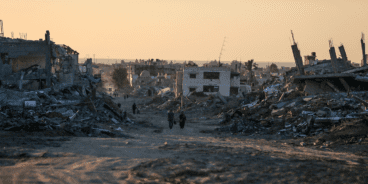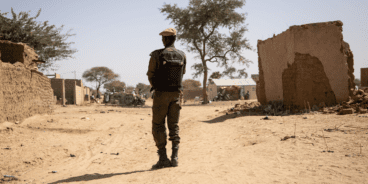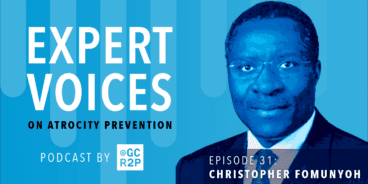
Statement on the Situation in Guinea, November 2010
The situation in Guinea requires international action if mass atrocities are to be prevented and world leaders’ 2005 acceptance of their responsibility to protect populations from genocide, war crimes, ethnic cleansing and crimes against humanity is to be upheld. On 7 November, a little over one year after the 28 September 2009 massacre of 156 protestors and rape of 106 women by security forces that drew substantial international attention to the country, Guineans will vote in the much anticipated and contested run-off presidential election that will pave the way for a transition from military to democratic civilian rule. Though the first round of presidential elections – on 27 June – passed peacefully, the situation in Guinea has recently deteriorated. The run-off has been postponed three times contributing to rising tension and violence between supporters of Alpha Conde who is running for the Rally for the People of Guinea party and Cellou Diallo of the Union for the Democratic Forces of Guinea. The two candidates primarily draw their respective support from the Malinke and Peuhl ethnic groups. In recent weeks, individuals – and their businesses and homes – have been the target of violence and abuse, on the grounds of their ethnicity and perceived political affiliation. According to the United Nations (UN), two people were reported killed, scores injured, and over two thousand people have been displaced.
While Guinean political, religious and community leaders have made commendable efforts to urge calm and stress national unity amongst Guinea’s various ethnic groups, the situation remains potentially explosive. There is a real risk that supporters of the two presidential candidates will contest the election results if their candidate does not win, leading to violence between ethnic groups that could escalate to the level of mass atrocities.
The security forces have a history of using excessive force, including during the September 2009 atrocities that a UN Commission of Inquiry concluded amounted to crimes against humanity. The International Criminal Court (ICC) has opened a preliminary inquiry into the events and the government’s response. As recently as 22 October 2010, the UN Office of the High Commissioner for Human Rights (OHCHR) expressed deep concern about the security forces’ “commission of serious human rights violations by indiscriminately shooting at unarmed civilians.” OHCHR further noted that individuals were reportedly threatened and assaulted on the basis of their “ethnicity and political affiliation.” Should the contestations turn violent, the security forces may again use excessive force, fragment along ethnic lines, or take advantage of the instability to stage a coup, all raising the likelihood that mass atrocities could occur.
The transitional government bears the primary responsibility to protect its population. Over the long term, current efforts to undertake security sector reform must be advanced. But in the immediate term, the government must ensure that the security forces exercise restraint, abide by international law and standards on the use of force, and protect all Guineans irrespective of their ethnic identity. The country’s interim leader Sekouba Konate has sought to uphold the government’s responsibility, pleading for calm and unity and declaring that he, and the security forces, will enforce a zero tolerance policy regarding ethnically-targeted violence. Konate has promoted members of the security forces that have behaved responsibly in the wake of the first round of the election and declared that those failing to act appropriately will face consequences. Yet the culture of impunity in Guinea is so ingrained that such messages may fail to deter perpetrators from committing crimes.
The international community has, in keeping with the responsibility to protect, been working with the transitional government since the 28 September 2009 commission of crimes against humanity to deter future mass atrocities and manage a smooth transition in governance. The Economic Community of West African States (ECOWAS) has been leading efforts supported by the International Contact Group on Guinea (ICG-G), the African Union (AU) and the UN. The ECOWAS-appointed mediator, Blaise Compaoré, the President of Burkina Faso, has been a constant presence working to establish the transitional government led by Konate and to mediate between the two presidential candidates. The UN system has been active. On 3 November the Secretary-General released a statement reminding the transitional government of its responsibility to protect and reiterating that “those responsible for fomenting violence or violating human rights” should be held to account. The head of the UN’s Office in West Africa, Said Djinnit has been going regularly to Conakry to meet with government and party officials, as has the AU’s Special Envoy for Guinea, Ibrahima Fall and a number of ambassadors from key member states. All of these efforts have conveyed a similar message of restraint, unity and the need for national leadership in order to prevent conflict and mass atrocities. UN agencies have been training human rights monitors, training the military in human rights, partnering with local NGOs to do public education campaigns about the elections and talking with the presidential candidates. On 17 September the UN Security Council released a press statement urging supporters of the two candidates to refrain from any provocation, incitement to hatred or resorting to violence. Statements expressing similar sentiments have been released by the Francophonie, the ICG-G, and individual member states. That there has been little violence and no mass atrocities in the past year is in part a testament to these efforts seeking to prevent crimes and move Guinea peacefully from military to democratic civilian rule.
Yet the coming weeks and months will be a critical test of the success of these measures. It remains vital that the efforts of Guinea’s leaders to deter and dissuade potential perpetrators of mass atrocity crimes are reinforced by coordinated international action. This requires the UN Secretary-General, Security Council, ECOWAS, African Union, and individual member states to warn that those that incite or commit mass atrocity crimes will be held accountable by domestic authorities, or should they fail to do so, by the ICC. The threat of targeted sanctions – such as the freezing of financial assets or travel bans – can be another deterrent dissuading those, including individuals within the government and security services, who may seek undermine the transition towards democratic civilian rule and might possibly foment violence. International actors must call on the two presidential candidates to uphold their 3 September Ouagadougou agreement to respect the outcome of the elections and to urge their supporters to do so as well. Resources should be dedicated to ensuring that the election is held in a credible, free and transparent manner. This includes ensuring that those recently displaced are able to vote. Should these conditions be met, international actors should be prepared to support the elected government including through security sector reform and strengthening judicial institutions.
While the responsibility to protect places a special emphasis on prevention, in unanimously adopting the responsibility to protect, member states have accepted a responsibility to take action to protect and save lives should preventive efforts fail. Humanitarian organizations already have plans in place to assist people that may be displaced by further violence. ECOWAS, the AU, the UN and concerned states need to have coordinated contingency plans in place today to halt mass atrocities should they occur. Failing to have plans in place runs the risk that instability, violence and mass atrocities may spread to neighboring Liberia, Sierra Leone and Cote d’Ivoire – all recent post-conflict states struggling to maintain their own security.
We commend the efforts of domestic and international leaders who are every day striving to uphold the responsibility to protect and avert mass atrocities in Guinea.
Related Content


Atrocity Alert No. 393: Burkina Faso, Venezuela and Ethiopia
